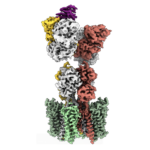About Us
The MRC Laboratory of Molecular Biology (LMB) is a research institute dedicated to the understanding of important biological processes at the levels of atoms, molecules, cells and organisms. In doing so, we provide knowledge needed to solve key problems in human health.
Our scientists tackle fundamental, often difficult and long-term research problems. The LMB has made revolutionary contributions to science, such as pioneering X-ray crystallography and electron cryo-microscopy (cryo-EM) to determine protein structures, the sequencing of DNA and the development of monoclonal antibodies. Twelve Nobel Prizes have been awarded for work carried out by LMB scientists.
The LMB also promotes the application and exploitation of our research findings, both by collaboration with existing companies and the founding of new ones, helping to advance medical research and the translation and application of knowledge.
The LMB provides an unsurpassed environment for both young and established researchers, with state-of-the-art facilities and a unique scientific culture. The LMB has always been very diverse, with a truly international outlook. We currently employ men and women from over 50 countries, and LMB alumni work in research organisations across the world.
Insight on Research
Distinct AMPA receptor sub-types reside within glial and neuronal cells of the cerebellum

Multidisciplinary study from Ingo Greger’s group in the LMB’s Neurobiology Division reveals the structures and subunit assembly of GluA4 AMPA receptors in the mammalian cerebellum that support cell-type specific functions.
Transplant of human chromosomes marks first step in genome synthesis project

Researchers in the LMB’s PNAC Division detail a new pipeline to implant human chromosomes into mouse cells and back again without genomic damage, marking an important step towards the overall goal of synthesising human genomes.
Quick Links
Latest News
 Neil Sands appointed Stores Manager
Neil Sands appointed Stores ManagerNeil Sands joined the LMB just over a year ago as the new Stores Manager, overseeing the inspection, receipting, handling, storage and distribution of all deliveries into the LMB. […]
 EMBO selects Ana Tufegdžić Vidaković to join Young Investigator Programme
EMBO selects Ana Tufegdžić Vidaković to join Young Investigator ProgrammeAna Tufegdžić Vidaković, Group Leader in the LMB’s PNAC Division, joins the global community of early-career researchers, with training, mentorship and networking opportunities from EMBO. […]
Latest Publications
- Purification and characterization of recombinant human translation initiation factor eIF3.
Diaz-Lopez, I., Gordiyenko, Y., Zuber, PK., Li, X., Ramakrishnan, V.
Protein Sci 35(1): e70388. (31st December 2025) - Structure of the G-coupled adhesion receptor ADGRL4.
Chen, Q., Gusach, A., Diamante, A., Patel, JC., Edwards, PC., Tate, CG., Favara, DM.
Nat Commun [Epub ahead of print]. (30th December 2025) - Neuroimmune interactions in arthritis: linking pain sensitisation and inflammation.
Sow, TTM., Hasegawa, T.
J Bone Miner Metab [Epub ahead of print]. (27th December 2025) - Industrial and agricultural chemicals exhibit antimicrobial activity against human gut bacteria in vitro.
Roux, I., et al.
Nat Microbiol 10(12): 3107-3121. (26th December 2025) - Metabolic control of porin permeability influences antibiotic resistance in Escherichia coli.
Caño Muñiz, SE., et al.
Nat Microbiol 10(12): 3202-3214. (24th December 2025) - Mycobacteria trehalose dimycolate interactions with host Mincle remodel blood-brain barrier junctions for brain invasion.
Hayes, MI., Ravishankar, S., Shanahan, JK., Fountain, AJ., Ramakrishnan, L., Madigan, CA.
Cell Rep 44(12): 116661. (23rd December 2025) - Global analysis of translocon remodeling during protein synthesis at the ER.
Sundaram, A., Li, Q., Wan, Y., Tang, J., Wu, H., Smalinskaitė, L., Hegde, RS., Ji, Z., Keenan, RJ.
Nat Struct Mol Biol 32(12): 2517-2525. (20th December 2025)
See more Publications





